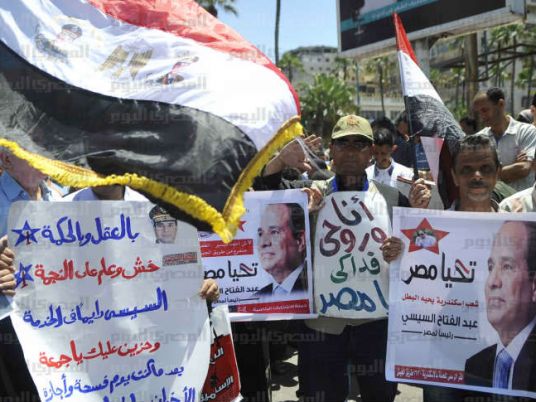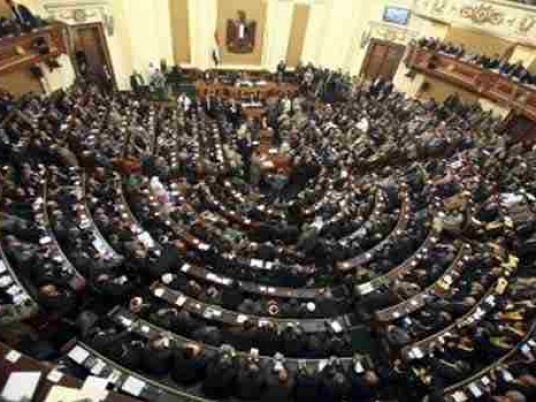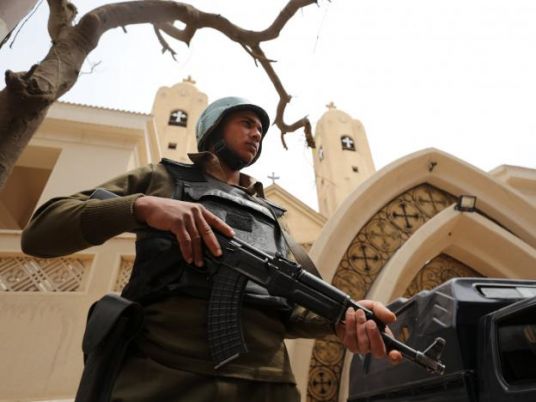
After 26 months in power, President Abdel Fattah al-Sisi's satisfaction rating with the Egyptian public has dropped to 82 percent, compared to 91 percent at the end his second year in office in June, according to the Egyptian Center for Public Opinion Research (Baseera).
The nationwide poll shows that 12 percent of Egyptians now disapprove of the president's performance, with only six percent undecided.
The poll was conducted nationwide on August 8 and 9, using a sample of 1,533 citizens over the age of 18, and respondents were asked to identify reasons for their approval — or lack of it.
Among the key reasons given for approving of the president were the massive Suez Canal project, his efforts to improve the security situation and infrastructure projects, such as building bridges and roads.
Around 32 percent identified the Suez Canal project as a reason for approval; 16 percent believed that the security has been improved; 11 percent said that they are satisfied due to improvements in roads and bridges; while 21 percent of the respondents were unable to cite a reason for their approval.
Meanwhile, those respondents registering as dissatisfied gave numerous reasons, with 53 percent disappointed with high prices, while 20 percent are dissatisfied with youth unemployment. Moreover, 8 percent of respondents referred to the drop in the Egyptian pound relative to the US, while another 8 percent said their had been no overall improvement in the country.

The division between the satisfied and dissatisfied was reflected in differing levels of education in respondents.
Over the two months since the previous poll, those with a background in higher education were more satisfied with Sisi's performance. The polls shows 78 percent of participants who hold degrees are satisfied with the president’s performance, compared to 69 percent at Sis's two-year mark in June.
Meanwhile, the satisfaction level for those without a degree sits at 87 percent of respondents.
Age also played a part, with more people in older age brackets describing themselves as satisfied than people than those in younger brackets. Of those over 50 years of age, 89 percent said they were satisfied with Sisi, compared to 71 percent of respondents under 30.
The poll also asked participants if they would vote for Sisi again if presidential elections were held tomorrow, with 66 percent saying that they would. This compares with 85 percent of respondents in a similar poll taken after he had been in power for just one year, and 81 percent at the two-year mark in June.
Meanwhile, another 13 percent said they would not re-elect Sisi now, while 21 percent said their decision would depend on who else was running in the election.
Young people were the least likely to say they would vote for him now, with just 51 percent of the those under 30, compared to 81 percent in the over-50 category.
Around the first anniversary of the completion of the new Suez Canal project, Sisi gave a speech at a special ceremony to mark the occasion. In the poll, Baseera asked respondents if they had heard or read the speech. Surprisingly, 73 percent of Egyptians had neither heard nor read the speech, with only 27 percent answering in the affirmative.
The poll asked if the new Suez Canal had had a positive impact on Egypt during the preceding year, with 43 percent answering yes, while 39 percent answered no, leaving 18 percent undecided.
Only 37 percent of people in the under-30 age bracket felt the canal had had a positive impact on the country, compared to 53 percent in the over-50 bracket.
Speaking to Egypt independent, economist Magdy Toulba said that the feelings of satisfaction or dissatisfaction with presidential performance are based mainly on Egyptian people's experience of daily life. He pointed to the increase in the cost of living as the biggest reason for dissatisfaction, since they increase the burden on ordinary people.
"The increasing exchange rate of the US dollar, which has hit unprecedented levels against the local currency, has caused a wave of frustration among people," he said.
In June 2016, Egypt’s core inflation rate jumped to 12.3 percent, the highest level since February 2009, according to the Central Bank of Egypt (CBE) website. Meanwhile, the Central Agency for Public Mobilization and Statistics said the consumer price index grew by 0.8 percent in June, reaching 14.8 percent.
"So far, no concrete improvements have taken place, especially because the president is working on long-term mega projects whose impacts are not obvious now," Toulba said
Sisi previously said that prices would not be affected by recent hikes in the price of the US dolalr against the Egyptian pound. He urged the armed forces to ratchet up efforts to distribute staple food commodities through its mobile outlets, setting prices that “suit low-income citizens, no matter how much the price of the dollar rises."
Baseera says that its poll was self-funded as a part of its social responsibility activities. The response rate was around 49 percent, and the margin of error in the results is less than 3 percent, it says.




